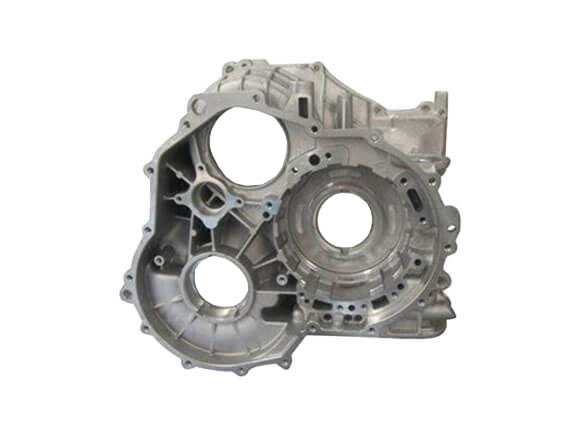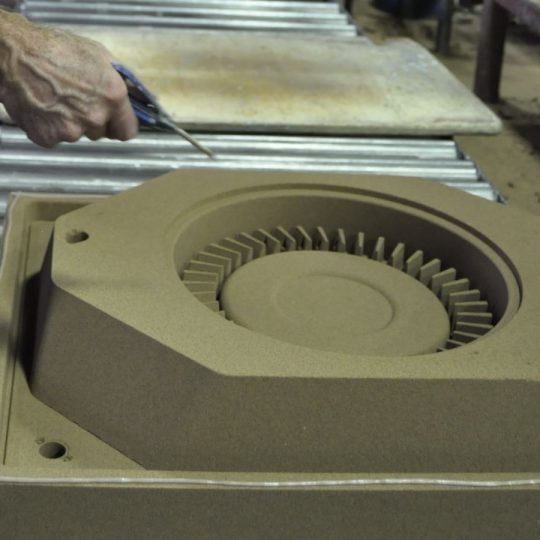Exploring the Science of aluminum casting
Wiki Article
Discover the Advantages of Aluminum Casting in Modern Manufacturing
Aluminum casting has become a crucial procedure in modern manufacturing. Its lightweight yet robust nature offers substantial advantages for different markets. The capacity to accomplish elaborate styles and preserve tight resistances contributes to its allure. Precision aluminum casting. Furthermore, the cost-effectiveness and environmental advantages make it a lasting selection. As makers look for innovative options, the duty of aluminum casting remains to progress. What certain applications and advantages await exploration in this dynamic area?Solid yet light-weight: The Benefits of Aluminum
Many products are used in manufacturing, aluminum stands out due to its remarkable mix of lightweight residential or commercial properties and exceptional toughness. This distinct characteristic makes aluminum a suitable option for different applications, particularly in sectors such as auto, aerospace, and building and construction. Its reduced density permits less complicated handling and transportation, adding to reduced energy intake throughout production and setting up procedures.Furthermore, aluminum's strength-to-weight ratio is remarkable, allowing manufacturers to develop sturdy parts without adding unneeded mass. This particular is specifically important in markets where weight decrease can result in enhanced fuel efficiency and general performance. In addition, aluminum's resistance to corrosion improves the long life of items, further solidifying its allure in modern-day manufacturing.
Eventually, the lightweight yet solid nature of aluminum positions it as a preferred material, promoting technology and efficiency across multiple markets. Makers increasingly recognize that these benefits can result in considerable developments in layout and capability.
Precision and Complexity in Layout
As suppliers welcome the capacities of aluminum casting, they discover brand-new methods for precision and intricacy in layout. This production procedure enables the production of detailed forms and thorough features that typical techniques often have a hard time to attain. The fluidity of molten aluminum enables it to fill complex mold and mildews, leading to parts with tight tolerances and fine surface area coatings.This precision is specifically useful in industries such as aerospace and vehicle, where precise specs are vital for performance and safety and security. Aluminum casting also suits cutting-edge styles that enhance functionality without endangering architectural integrity.

Cost-Effectiveness and Efficiency
Cost-effectiveness and efficiency are paramount considerations for suppliers exploring aluminum casting as a production technique. Aluminum casting deals significant expense advantages as a result of its reduced product costs contrasted to other steels (Precision aluminum casting). The lightweight nature of aluminum minimizes delivery and handling expenditures, and its superb thermal conductivity permits quicker cooling times during the casting process, improving overall production rateAluminum's adaptability makes it possible for makers to produce complicated shapes and styles, lessening the need for extra machining or assembly. This streamlining of production not only decreases labor expenses however likewise reduces preparations, enabling business to react quickly to market needs.
The resilience and deterioration resistance of aluminum castings add to longer item lifespans, minimizing replacement prices over time. Because of this, suppliers can accomplish a balance of top notch outcome and lowered operational expenditures, making aluminum casting a significantly attractive alternative in contemporary production.
Environmental Sustainability of Aluminum Casting
Aluminum casting attracts attention as an ecologically lasting manufacturing alternative, particularly as a result of its recyclability and decreased eco-friendly footprint. The procedure allows for the effective use aluminum, a material that can be reused indefinitely without losing its buildings. This characteristic significantly decreases the demand for virgin aluminum, therefore conserving natural sources and lessening power intake related to removal and processing.
Applications Across Industries: From Automotive to Aerospace
While varied markets remain to look for ingenious materials for production, aluminum casting has confirmed to be a flexible solution throughout industries such as automotive and aerospace. In the auto market, aluminum castings add to lightweight automobile layouts, boosting gas efficiency and performance. Parts like engine blocks, transmission housings, you could look here and wheels take advantage of aluminum's strength-to-weight ratio.Similarly, in aerospace, aluminum casting plays a substantial duty in generating intricate components that need high durability and low weight. Airplane components such as braces, landing gear, and architectural frames use aluminum for peak performance and safety.
In addition, the versatility of aluminum casting enables it to satisfy other markets, consisting of customer electronics, marine, and industrial machinery. This flexibility not just fulfills the particular requirements of different applications yet additionally sustains ongoing advancement in making procedures. Therefore, aluminum casting stays a crucial gamer in modern-day production throughout many fields.
Frequently Asked Questions
How Does Aluminum Casting Compare to Other Metal Casting Processes?
Aluminum casting offers remarkable strength-to-weight ratios, faster air conditioning rates, and exceptional corrosion resistance compared to other steel casting processes. These advantages make it ideal for different applications, boosting efficiency and performance in manufacturing.What Are the Regular Lead Times for Aluminum Casting Projects?
Common preparation for aluminum casting tasks range from two to 8 weeks, relying on variables such as complexity, order size, and production capacity. Efficient preparation can aid decrease hold-ups and improve project timelines.Can Aluminum Casting Be Used for Intricate Layouts?
Aluminum casting can without a doubt suit complex styles. Aluminum Foundry. Its fluidness permits for in-depth patterns and shapes, making it suitable for intricate elements in various industries. This convenience boosts style freedom while keeping structural integrity and performanceWhat Post-Processing Options Are Available After Aluminum Casting?
Post-processing options for aluminum casting include machining, brightening, surface area treatments, anodizing, and welding. These techniques enhance the surface, enhance dimensional accuracy, and increase rust resistance, thus enhancing the end product's performance and visual appeal.Exactly How Do Temperature Level Adjustments Influence Aluminum Casting High Quality?
Temperature adjustments significantly impact aluminum casting top quality by influencing fluidity, solidification prices, and potential flaws. Rapid cooling can bring about enhanced brittleness, while too much warmth might trigger warping or incomplete dental filling of molds during casting.Aluminum casting has arised as a critical procedure in modern manufacturing. As manufacturers accept the capacities of aluminum casting, they discover new opportunities for precision and intricacy in design. Aluminum casting processes typically generate fewer greenhouse gas exhausts contrasted to other metal casting he said approaches. While varied markets proceed to look for innovative materials for production, aluminum casting has actually shown to be a flexible remedy throughout industries such as vehicle and aerospace. In the automotive sector, aluminum castings add to lightweight this link car layouts, boosting gas efficiency and performance.
Report this wiki page